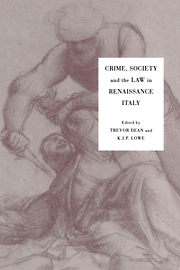Book contents
- Frontmatter
- Contents
- Illustrations
- List of contributors
- Preface
- 1 Writing the history of crime in the Italian Renaissance
- 2 Criminal justice in mid-fifteenth-century Bologna
- 3 The judicial system in Florence in the fourteenth and fifteenth centuries
- 4 The incidence of crime in Sicily in the mid fifteenth century: the evidence from composition records
- 5 Theology, nature and the law: sexual sin and sexual crime in Italy from the fourteenth to the seventeenth century
- 6 Practical problems in the enforcement of Italian sumptuary law, 1200–1500
- 7 The prince, the judges and the law: Cosimo I and sexual violence, 1558
- 8 Intervention by church and state in marriage disputes in sixteenth- and seventeenth-century Florence
- 9 The writer and the man. Real crimes and mitigating circumstances: il caso Cellini
- 10 The political crime of conspiracy in fifteenth- and sixteenth-century Rome
- 11 Fighting or flyting? Verbal duelling in mid-sixteenth-century Italy
- 12 Banditry and lawlessness on the Venetian Terraferma in the later Cinquecento
- 13 Mihi vindictam: aristocratic clans and rural communities in a feud in Friuli in the late fifteenth and early sixteenth centuries
- Index
10 - The political crime of conspiracy in fifteenth- and sixteenth-century Rome
Published online by Cambridge University Press: 14 October 2009
- Frontmatter
- Contents
- Illustrations
- List of contributors
- Preface
- 1 Writing the history of crime in the Italian Renaissance
- 2 Criminal justice in mid-fifteenth-century Bologna
- 3 The judicial system in Florence in the fourteenth and fifteenth centuries
- 4 The incidence of crime in Sicily in the mid fifteenth century: the evidence from composition records
- 5 Theology, nature and the law: sexual sin and sexual crime in Italy from the fourteenth to the seventeenth century
- 6 Practical problems in the enforcement of Italian sumptuary law, 1200–1500
- 7 The prince, the judges and the law: Cosimo I and sexual violence, 1558
- 8 Intervention by church and state in marriage disputes in sixteenth- and seventeenth-century Florence
- 9 The writer and the man. Real crimes and mitigating circumstances: il caso Cellini
- 10 The political crime of conspiracy in fifteenth- and sixteenth-century Rome
- 11 Fighting or flyting? Verbal duelling in mid-sixteenth-century Italy
- 12 Banditry and lawlessness on the Venetian Terraferma in the later Cinquecento
- 13 Mihi vindictam: aristocratic clans and rural communities in a feud in Friuli in the late fifteenth and early sixteenth centuries
- Index
Summary
Historically, Italian conspiracies have been treated as isolated incidents with their own particular, local causes and little attention has been paid to searching for links and comparisons among them. However, traditions undoubtedly existed and conspiracies of whatever sort did not take place in a vacuum; often they were a continuation in another form of previous ones. Similarly, in studies of Renaissance Italy conspiracy tends to be classified as an event and not as a category of crime, and this has focussed interest on its internal dynamics rather than on its external justification. For a historian, as for contemporaries, to view something as a crime raises the possibility that the accused might not be guilty (or by logical extension, that in certain circumstances the particular crime under investigation might never even have taken place), whereas an event undoubtedly happened. The implications of this labelling are important. Advantage was seen to lie with those who actively discovered conspiracies for they could then construct and announce what type of activity had taken place. Events can be ‘discovered’ only if they have previously been kept secret, and secrecy by itself implies guilt. A denial of guilt was expected and therefore worthless. If the deed were declared to have been perpetrated against a person of divine or human authority, such as a pope or a prince, there was even less need for tangible evidence, as any attempt to suggest innocence necessarily implied guilt of a different kind, for disbelieving the version of events publicized by the ruler.
- Type
- Chapter
- Information
- Crime, Society and the Law in Renaissance Italy , pp. 184 - 203Publisher: Cambridge University PressPrint publication year: 1994
- 2
- Cited by



